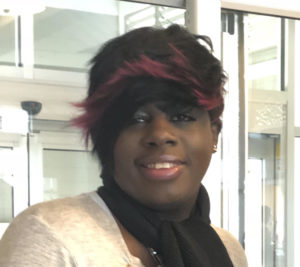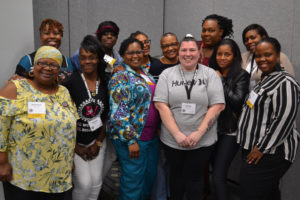 Our October Shero of the Month is Kneeshe Parkinson of St. Louis, Missouri. She is the PWN State Lead for Missouri, a current PWN Policy Fellow, and a fierce advocate.
Our October Shero of the Month is Kneeshe Parkinson of St. Louis, Missouri. She is the PWN State Lead for Missouri, a current PWN Policy Fellow, and a fierce advocate.She’s also a dedicated team player. Said Olga Irwin, a member of her team on the PWN Policy Fellowship practicum, who nominated her for Shero of the Month, “She always reminds us of upcoming assignments and webinars. She also planned and wrote an abstract for our team for USCA, even though she already had a scholarship for herself–she wanted to find a way to get the whole team there.”
Advocacy runs in Kneeshe’s veins: She grew up in a family of activists. “Before I knew anything about lobbying or mobilizing, my dad was an activist. He went to all the marches in D.C. for civil rights. Everyone participated.”
Her aunt Helena Hatch, who died of AIDS-related complications in the early ’80s, was a particular inspiration for Kneeshe’s advocacy. Her aunt marched in the streets under her slogan–“Women need to know”–and brought people to get tested, handed out condoms in public parks, and led the fight for women living with HIV locally. Her advocacy was so important that there is a women’s clinic, the Helena Hatch Special Care Center for Women, at the Washington University School of Medicine in St. Louis, which provides care to women diagnosed with HIV or AIDS, regardless of their ability to pay. Kneeshe began dedicating her time there at a young age.
“I eat, breathe, and sleep advocacy,” said Kneeshe. “If my voice goes dormant, who am I helping? I can’t shut up. I’m a woman living with HIV first. My voice does matter. I can’t change my diagnosis, but I can adapt in a meaningful way to improve life for others.”
Kneeshe cites her involvement in Positive Women’s Network – USA as a highlight in her years of advocacy–in particular, being a PWN Policy Fellow. “Being part of PWN has enlightened me,” she explained. “I’ve had the opportunity to learn, to be chosen to do this work in policy. Hearing the lived experiences that others have walked through; all the women I’ve had an opportunity to sit down with and talk to, knowing they’re at the forefront of a movement” has helped her grow and think big.
Asked about her goals for the future, Kneeshe shared some big plans. She envisions herself working with a national organization within five years, and within the next ten to fifteen years, she plans to have a Master degree and a PhD in public health.
Her advice to any woman living with HIV considering getting involved in advocacy? “Advocacy can’t hurt. It can only make us change-makers–to continue the ‘we’ movement, so we can have access for all.”



